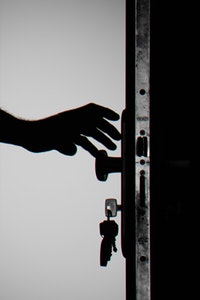I went to the mall one Tuesday for one of those free Apple tutorial classes at the Apple stores. As I was leaving, I’d stopped in a couple of other stores before deciding it was time to head home. The exit I chose was one with the automatic glass doors, the same ones I’d entered through. I’d walked through the first set with no problem. The second set, however, did not cooperate.
Again, I walked toward the doors and they didn’t do the Red Sea parting thing the way they were supposed to. So, I stood there for a second, then I backed up thinking maybe I’d gotten too close, too fast. Okay, that didn’t work, so I tried walking closer, this time more slowly. Still nothing.
I could have tried forcing it open, but knowing me, I would have broken the door, hurt myself, or triggered an alarm. I’m sure of it, so I didn’t dare try. After about 5 or 6 failed attempts to exit the mall (I guess they wanted me to stay awhile and spend more money), I looked up.
Yep, I looked straight up into the door sensor. And, you know what? It opened!
Now, had I just looked up from the beginning, I would’ve been headed to my car about seven minutes sooner.
God Will Make it Happen For Your Good
 Right now, I’m sure you’re ready for me to go ahead and make my point. Okay, there have been times in my life that I have tried walking through doors that would not open when and how I thought they should. And for good reason – I was going about it all wrong. I was trying to walk through those doors on my own.
Right now, I’m sure you’re ready for me to go ahead and make my point. Okay, there have been times in my life that I have tried walking through doors that would not open when and how I thought they should. And for good reason – I was going about it all wrong. I was trying to walk through those doors on my own.
Some doors I ran to and others I thought to try the slow-moving approach. And when they didn’t open, I backed myself up and tried again. It took me a while to catch on to some things. For example…
Without God, doors will not open. Not the right doors, anyway. There’s always the matter of trying to force the door to open, make it happen, but that only caused situations in my life to turn out worse. Just like the outcome of trying to force a physical door open, I broke some things, I got hurt, and even triggered some alarms.
None of those outcomes was worth it. I’ve found that it is only when I choose to look up to God that my doors will open – at the right time, and without the drama (Proverbs 10:22).
You will find the same thing, that your doors will open at the appointed time when you look to God.
So, What’s the Play Call?
I know it seems like a waste of time to just stand at the door without bursting or gliding through it. But, that’s when we try to make it happen using our own strength, resources, and know-how. The absolute truth is that those are the times when we need to trust God the most.
Here are some things to remember when the “automatic door” isn’t so automatic for you:
- Look up. It’s that simple. So often, we are so preoccupied with what is in front of us that we never take the time to look to God for His solution. “And when these things begin to come to pass, then look up, and lift up your heads; for your redemption draweth nigh.” Luke 21:28
- Wait on God. This one can get tricky when you’re standing right in front of the door that you believe is open for you at that moment. I admonish you to trust that God’s timing is perfect and He will strengthen you as you wait. “Wait on the Lord: be of good courage, and he shall strengthen thine heart: wait, I say, on the Lord.” Psalms 27:14
- Ask God to direct your steps. When God is in control of how and where you walk, He has free reign to lead you to the doors that have been designed especially for you. “The steps of a good man are ordered by the Lord: and he delighteth in his way.” Psalms 37:23
- Remember, no matter what you have thought up for yourself, God’s plans are greater. I know this may be difficult when the opportunity seems to be right in front of you, but God’s thoughts are always better than ours. “Now unto him that is able to do exceeding abundantly above all that we ask or think, according to the power that worketh in us.” Ephesians 3:20
Waiting on that one door to open can be excruciating, especially when you feel you have other places to be. I encourage you, though, not to keep trying on your own to make it happen.
The next time your door seems to be stuck, look up to God! He has a master plan for you.




